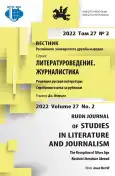America’s Union Carbide Corporation and Bhopal Disaster: Study in the Light of Public Relations Before and After the Incidence
- Authors: Patel K.1, Binjola H.2
-
Affiliations:
- Indira Gandhi National Open University
- Graphic Era Hill University
- Issue: Vol 27, No 2 (2022): THE RECEPTION OF SILVER AGE RUSSIAN LITERATURE ABROAD
- Pages: 436-446
- Section: JOURNALISM
- URL: https://journal-vniispk.ru/2312-9220/article/view/318967
- DOI: https://doi.org/10.22363/2312-9220-2022-27-2-436-446
- ID: 318967
Cite item
Full Text
Abstract
This study tries to understand the Bhopal disaster (aka Bhopal Gas Tragedy) in the light of public relation and the role played by Union Carbide Corporation in the Bhopal disaster which resulted in the death of over 3 000 people and 15 000 were injured during the disaster. This case shocked the entire nation and nobody had ever imagined that an industrial accident could be that deadly and venomous. The researcher is trying to understand the incidence from the perspective of public relations and how Union Carbide played its role in the light of public relations. This study is trying to understand that how Union Carbide would have made a difference to its image if they would have responsibly used public relations for its better international image and social responsibility in India. Bhopal Gas Tragedy was an important case for understanding crisis and this case also highlighted that how PR could have been used for handling the situation and for managing relations with people. This case was the talk of the town as thousands were affected and it was a national casualty. This case raised many issues pertaining to Management and people and it also underlined that improved management could have led to better treatment of the case.
About the authors
Keshav Patel
Indira Gandhi National Open University
Email: keyshavpatel@gmail.com
ORCID iD: 0000-0001-9072-291X
Academic Counsellor
Maidan Garhi, New Delhi-110068, IndiaHimani Binjola
Graphic Era Hill University
Author for correspondence.
Email: binjola.himani@gmail.com
ORCID iD: 0000-0002-6903-7632
Assistant Professor, Department of Media & Mass Communication
Road Society Area, Clement Town, Dehradun, Uttarakhand, 248002, IndiaReferences
- Abraham, M. (1984). The Lessons of Bhopal: A Community Action Resource Manual on Hazardous Technologies. Penang, Malaysia: International Organization of Consumers Unions, Regional Office for Asia and the Pacific
- Agarwal, A. (2019). 35 years of Bhopal Gas Tragedy: Anil Agarwal on what happened that fateful night. Retrieved from https://www.downtoearth.org.in/news/environment/35years-of-bhopal-gas-tragedy-anil-agarwal-on-what-happened-that-fateful-night-68232
- Banerjee, B.N. (1986). Bhopal gas tragedy: accident or experiment. New Delhi: Paribus Publishers and Distributors.
- Bergman, D. (1988). The sabotage theory and the legal strategy of Union Carbide. New Law Journal, 138.
- Bhopal, industrial genocide?: a unique compilation of documents from Indian publications. (1985). Hong kong: ARENA Press.
- Bowonder, B. (1987). An analysis of the Bhopal accident. Project Appraisal, 2(3), 157-168. https://doi.org/10.1080/02688867.1987.9726622
- Broughton, E. (2005). The Bhopal disaster and its aftermath: a review. Environmental health, 4(6). https://doi.org/10.1186/1476-069X-4-6
- Chatterjee, P. (2012). WikiLeaks’ Stratfor dump lifts lid on intelligence-industrial complex. Retrieved from https://www.theguardian.com/
- Diamond, S. (1985). The Bhopal Disaster: How it happened. Retrieved from https://www.nytimes.com/
- Eckerman, I. (2004). The Bhopal Saga - Causes and Consequences of the World’s Largest Industrial Disaster. Bhopal, Madhya Pradesh, India: Universities Press. https:// doi.org/10.13140/2.1.3457.5364
- Edwards, T. (2014). Criminal Failure and “The Chilling Effect”: A Short History of the Bhopal Criminal Prosecutions. Social Justice, 41(1/2), 53-79.
- Fortun, K. (2001). Advocacy alter Bhopal: Environmentalism, Disaster, New Global Orders. Chicago, London: The University of Chicago Press. ICJB. (n.d.). 1969-1979: Union Carbide Enters Bhopal. Retrieved from https://www.bhopal.net/
- Amnesty International. (2004). Clouds of Injustice: Bhopal Disaster 20 Years On. Amnesty International Publ.
- Lewis, S. (2007). The Bhopal Chemical Disaster: Twenty Years Without Justice. Retrieved from https://archive.org/details/SanfordLewisTwentyYearsWithoutJusticeTheBhopalChemicalDisaster
- Narain, S., Bhushan, C. (2014). 30 years of Bhopal gas tragedy: a continuing disaster. Retrieved from https://www.downtoearth.org.in/coverage/environment/30-years-of-bhopal-gas-tragedy-a-continuing-disaster-47634
- Sachdeva, I. (2009). Public Relations: Principles and Practices. Oxford Higher Education.
- Sahabat Alam Malaysia (SAM) & Asia-Pacific’s People’s Environment Network (APPEN). (1986). The Bhopal Tragedy - One Year After. Penang, Malaysia: SAM.
- Tombs, F.P. (2011). Flowers at the altar of profit and power: The continuing disaster at Bhopal. Retrieved from https://www.crimetalk.org.uk/
Supplementary files









